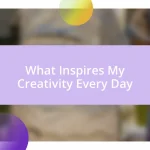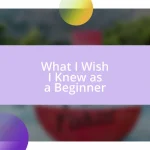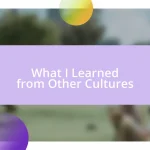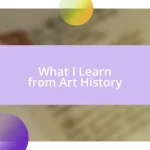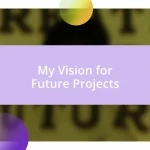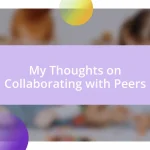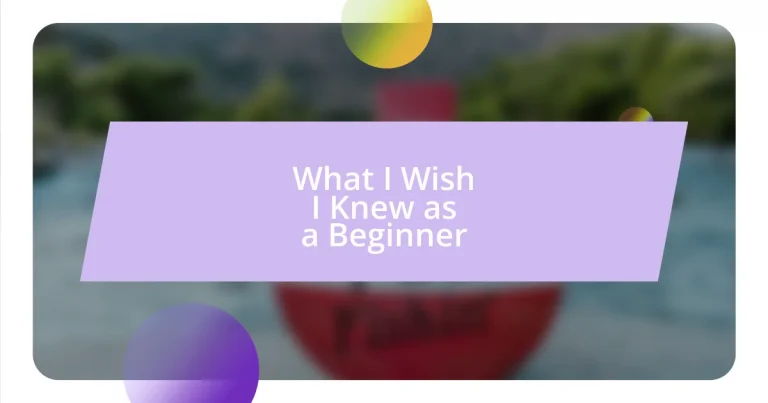Key takeaways:
- Understanding the learning curve involves embracing ups and downs, celebrating small victories, and being patient with oneself.
- Building a strong foundation through mastering basics and consistent practice is essential for tackling advanced concepts effectively.
- Seeking feedback, avoiding comparisons, and setting specific goals are crucial strategies for personal growth and skill development.
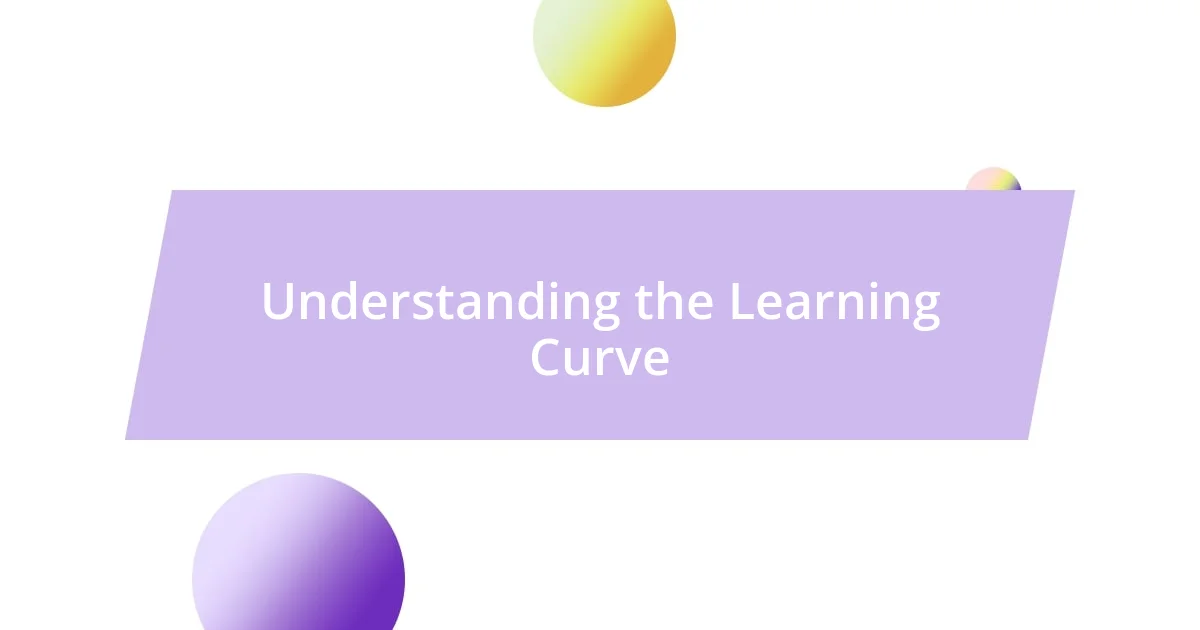
Understanding the Learning Curve
Understanding the learning curve can feel overwhelming at first, but it’s a crucial aspect of any new endeavor. I remember when I started learning to play the guitar. Initially, the chords felt foreign, and I often wondered if I’d ever get the hang of it. That feeling of frustration is something many beginners face.
As I progressed, I realized that the learning curve isn’t a straight line; it’s more like a series of ups and downs. One moment, I felt like a rock star belting out my favorite songs, and the next, I struggled to remember a simple finger placement. Have you ever experienced that swing between confidence and self-doubt? It’s a natural part of the process and reminds us to be patient with ourselves.
Reflecting on my journey, I’ve learned that every setback is an opportunity for growth. Embracing those tough moments taught me resilience. Instead of shying away from challenges, I began to seek them out. What did you wish you could handle better when you started learning something new? Over time, I found that the key to overcoming the learning curve was to celebrate small victories and keep pushing forward, even when progress seemed slow.
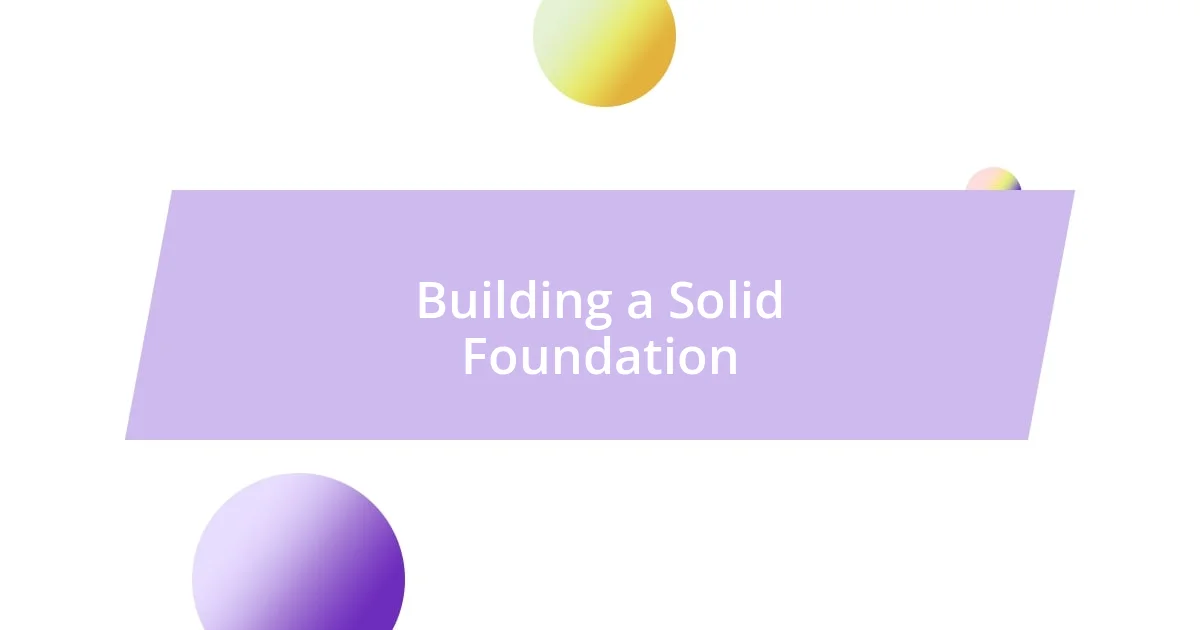
Building a Solid Foundation
Building a solid foundation is essential in any new journey. In my experience, when I began learning to code, I immersed myself in the basics. I often thought, “Why do I need to know how to write HTML before diving into JavaScript?” But soon enough, I realized that understanding foundational concepts provided me with the clarity to tackle complex challenges later. It’s like attempting to cook without knowing how to chop an onion properly—you’ll find yourself struggling in the kitchen.
As I dug deeper, I discovered that repetition and practice were game-changers. For instance, I remember spending hours simply writing basic functions. At first, it felt tedious, but with time, those same functions became second nature. This practice not only built my confidence but also significantly improved my problem-solving skills. How often do we overlook the importance of mastering the fundamentals because they seem boring? Learning to embrace those early stages can transform the way we approach more complex tasks down the line.
Equipping myself with a strong foundation ultimately made advanced concepts feel more accessible. I can clearly recall the exhilaration I felt when I successfully connected the dots between foundational knowledge and real-world applications. It’s like constructing a house—you wouldn’t start on the walls without first laying the groundwork. Investing time in the basics is undeniably rewarding, and I encourage everyone to cherish that gradual but crucial phase in their learning journey.
| Aspect | Importance |
|---|---|
| Understanding Basics | Sets the groundwork for advanced learning. |
| Consistent Practice | Helps solidify knowledge and builds confidence. |
| Connection to Real-World Applications | Enhances problem-solving and practical skills. |
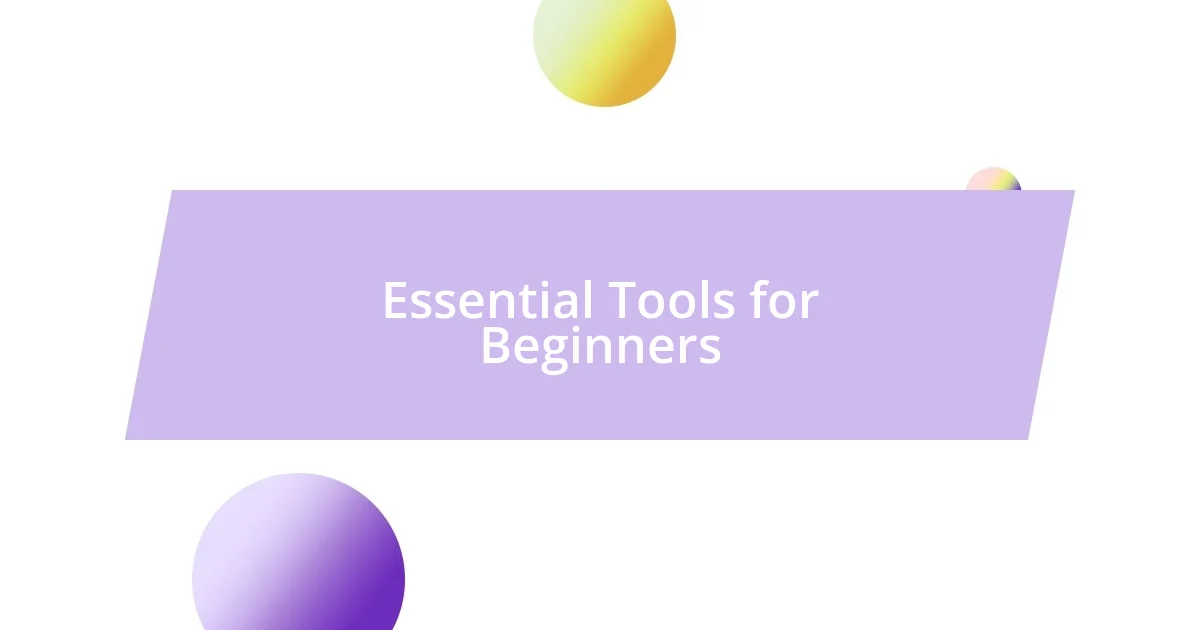
Essential Tools for Beginners
When I began my journey in photography, I was overwhelmed by the array of tools available. I remember standing in the camera store, unsure whether to invest in a fancy lens or complementary accessories. It became clear that while advanced equipment can enhance your work, having the right essential tools is far more critical, especially when you’re just starting. You don’t need to break the bank; instead, focus on quality basics that help build your skills and confidence.
To get you started on the right foot, here’s a list of essential tools I found invaluable:
- Camera: A reliable camera body, whether it’s a DSLR or a mirrorless model, is crucial for capturing quality images.
- Lens: A versatile lens, such as a 50mm prime, is perfect for various situations and helps you learn about depth of field.
- Tripod: Stability is everything! A sturdy tripod allows for long exposures, and low-light photography, enhancing your creativity.
- Editing Software: Programs like Lightroom or Photoshop help you refine your images, making post-processing an enjoyable learning experience.
- Notebook: I always kept a small notebook with me to jot down ideas, settings, and reflections on my shooting experiences.
As I developed my skills, I learned that having these tools not only made my learning process smoother but also gave me the confidence to experiment more freely. I vividly recall my first outdoor shoot, where I was anxious about making mistakes. But knowing I had the right tools helped me embrace the process, turning every click into a chance to grow. Trust me, having these essentials will set a solid foundation for your creative journey, letting you focus on honing your skills without distractions.
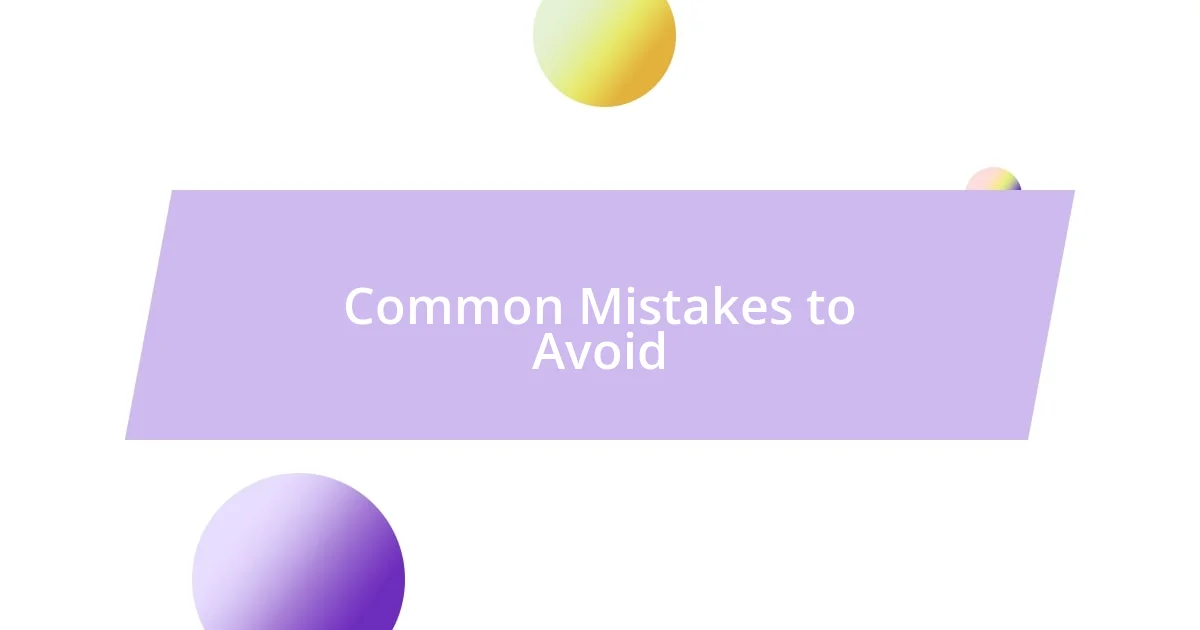
Common Mistakes to Avoid
One of the most common mistakes I see beginners make is neglecting to seek feedback. I clearly recall when I started out, I was hesitant to share my work for fear of criticism. But as I learned, constructive feedback is invaluable; it’s like having a compass guiding you through uncharted territory. Have you ever faced a situation where you weren’t sure if you were heading in the right direction? Opening yourself up to input not only brings fresh perspectives but also accelerates your growth.
Another pitfall is the tendency to overcomplicate things. There were times when I genuinely believed that flashy techniques were the key to success. I remember spending hours trying to implement fancy edits in my photos rather than focusing on the art of storytelling through simpler images. Simplicity often speaks volumes—are we forgetting that sometimes less truly is more? By mastering the basics and keeping things straightforward, you’ll find a clearer path forward in your learning.
Lastly, I learned the hard way about the danger of comparison. Early on, I often found myself scrolling through the work of seasoned professionals, feeling disheartened. It didn’t take long for me to realize that each artist’s journey is unique, and it’s easy to overlook the countless hours they’ve put into their craft. Have you ever felt like you were racing against others rather than enjoying your own progress? Shifting the focus back to your personal growth can be liberating, enabling you to celebrate your milestones instead of fixating on where you think you should be.
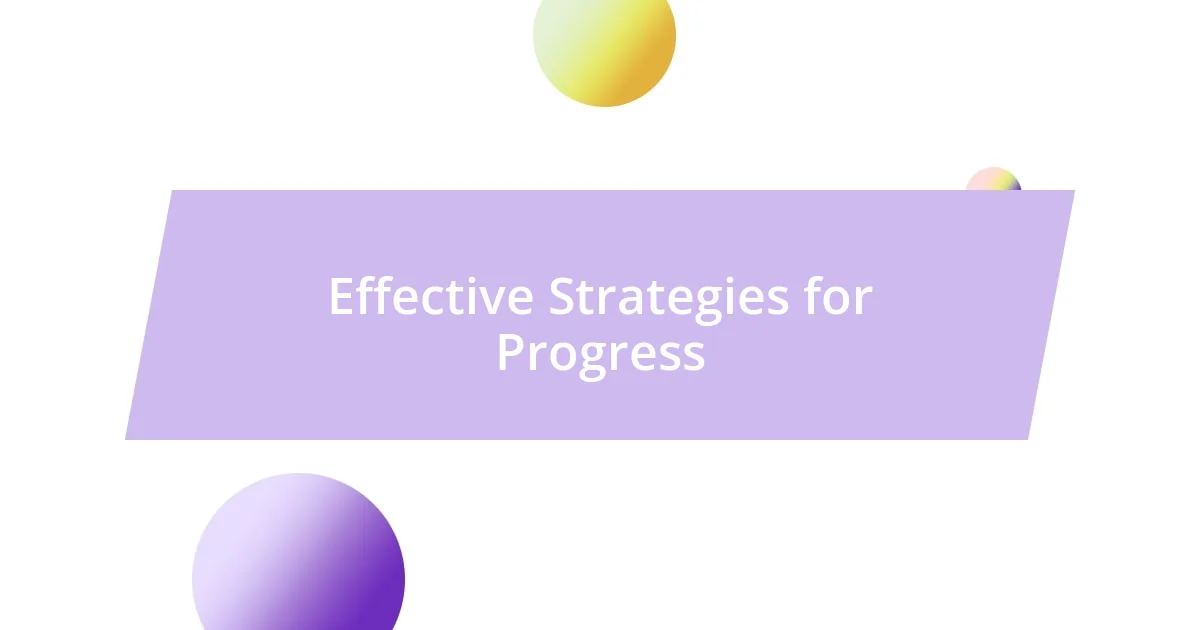
Effective Strategies for Progress
One effective strategy I wish I had embraced earlier is setting specific goals. Initially, I often drowned in the vast sea of knowledge without direction. It wasn’t until I wrote down my intentions—like mastering manual settings or completing a themed photo project—that my progress truly surged. Have you ever felt like your efforts were scattered? By channeling my focus, I could celebrate small victories along the way, making the journey much more rewarding.
Another approach that transformed my learning experience was the ’50/50 Rule.’ I heard about it in a workshop, and it simply means dedicating half of your time to practicing skills and the other half to exploring creativity. I recall attending a local event armed with a digital camera, committing to this balance. While I practiced framing shots, I also played with perspectives and angles, leading to some surprisingly impactful images. How often do we get stuck in a technical rut? Allowing myself to explore creatively opened new doors I hadn’t even considered.
Lastly, I can’t emphasize the importance of community enough. Joining local photography groups or online forums made a world of difference for me. Initially, I was apprehensive about networking, as I often feared being out of my depth. But my first meetup turned out to be a treasure trove of knowledge, with fellow photographers generously sharing tips and experiences. Have you ever felt isolated in your journey? Finding a community that encourages and inspires can accelerate your growth significantly. It’s both comforting and empowering to share passions with others on a similar path.
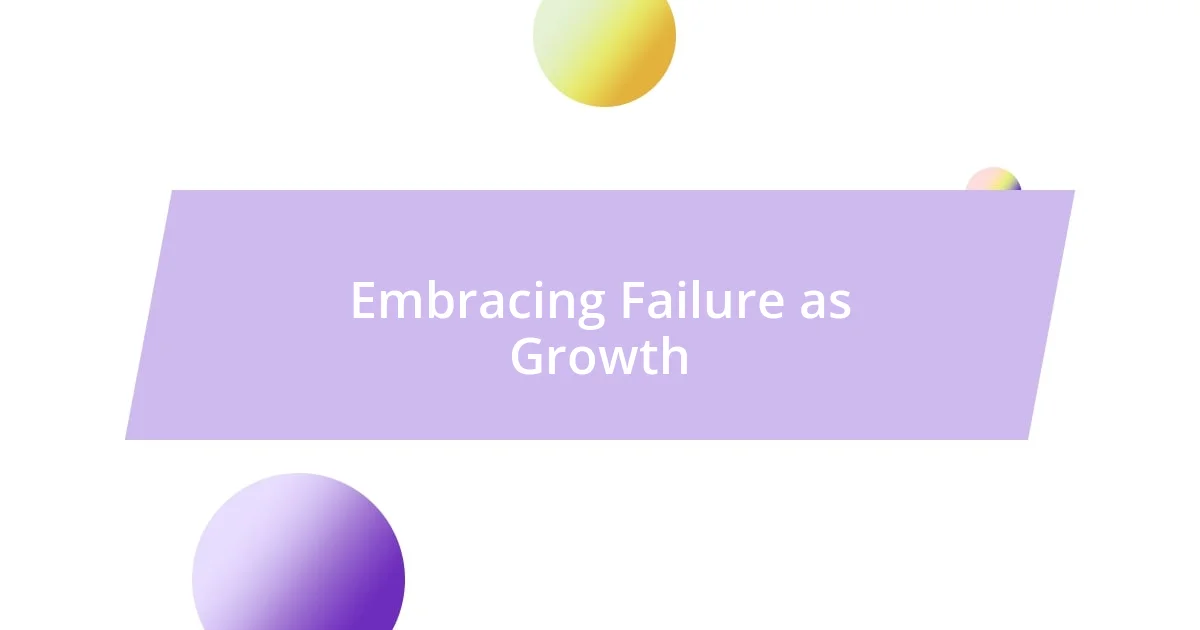
Embracing Failure as Growth
Embracing failure has been one of the most eye-opening experiences in my journey. I remember an early project where I missed the mark entirely—my lighting was off, and my subject didn’t resonate with the audience. At that moment, I felt so discouraged. But as I reviewed the mistakes, I recognized how each misstep was an opportunity to learn. Have you ever looked back on a failure and realized it shaped your perspective? It’s incredible how our greatest setbacks can teach us the most invaluable lessons.
I’ve grown to view failure as a crucial stepping stone in my creative process. There was a time when I put together a portfolio that I thought was the pinnacle of my work, only to receive lukewarm reactions. It hurt, but when I analyzed the feedback, I discovered exactly what I needed to improve. I began to welcome criticism as a guide rather than a setback. Isn’t it fascinating how what we often dread—the fear of falling short—can actually propel our growth forward?
Now, I actively celebrate my failures as milestones of progress. Each time I’ve stumbled, I’ve taken a moment to reflect on what went wrong and how I can avoid similar pitfalls in the future. For instance, I once spent weeks on a project that ultimately fell flat because I hadn’t connected with my audience’s interests. Instead of dwelling on disappointment, I treated it like valuable research. Have you ever stopped to ask yourself how your failures might be preparing you for greater success? The more I appreciate these moments of struggle, the more resilient I become on this journey.
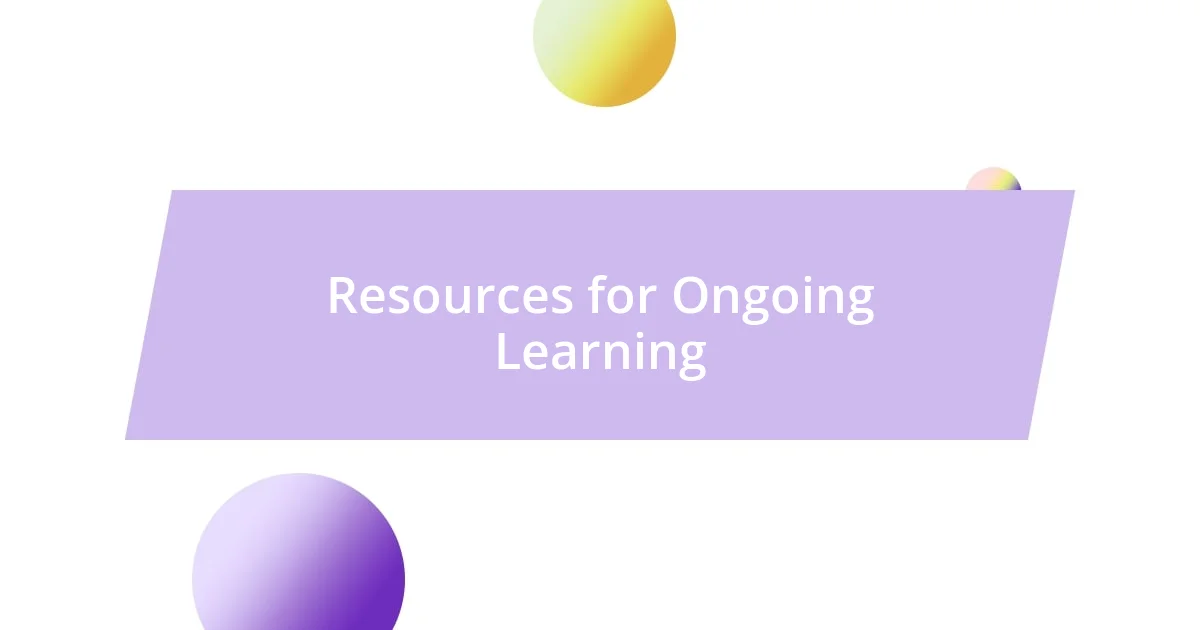
Resources for Ongoing Learning
When it comes to resources for ongoing learning, I can’t stress the value of online courses enough. I once took a photography class on a whim, led by a renowned photographer. The format felt like a personal mentorship, with tailored feedback on my work. Have you ever been pleasantly surprised by how much you could gain from just a few structured lessons? By investing a little time in these courses, I unlocked techniques that would have taken me years to discover on my own.
I also found attending workshops to be incredibly enriching. I vividly recall a day-long event where I was introduced to advanced editing techniques using software I had barely touched before. The hands-on experience offered direct exposure to professional insights. Isn’t it amazing how face-to-face interactions can lead to those lightbulb moments? Experiencing those concepts in real-time significantly improved my workflow and opened up a world of creative possibilities.

